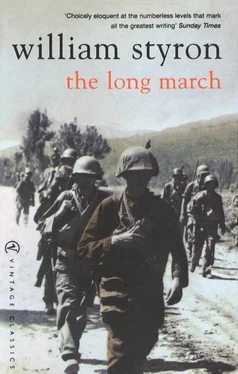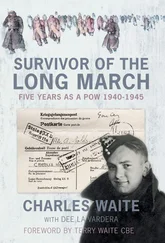William Styron - The Long March
Здесь есть возможность читать онлайн «William Styron - The Long March» весь текст электронной книги совершенно бесплатно (целиком полную версию без сокращений). В некоторых случаях можно слушать аудио, скачать через торрент в формате fb2 и присутствует краткое содержание. Город: New York, Год выпуска: 1952, ISBN: 1952, Издательство: Vintage Classics, Жанр: prose_military, на английском языке. Описание произведения, (предисловие) а так же отзывы посетителей доступны на портале библиотеки ЛибКат.
- Название:The Long March
- Автор:
- Издательство:Vintage Classics
- Жанр:
- Год:1952
- Город:New York
- ISBN:978-0099422792
- Рейтинг книги:3 / 5. Голосов: 1
-
Избранное:Добавить в избранное
- Отзывы:
-
Ваша оценка:
- 60
- 1
- 2
- 3
- 4
- 5
The Long March: краткое содержание, описание и аннотация
Предлагаем к чтению аннотацию, описание, краткое содержание или предисловие (зависит от того, что написал сам автор книги «The Long March»). Если вы не нашли необходимую информацию о книге — напишите в комментариях, мы постараемся отыскать её.
The Long March — читать онлайн бесплатно полную книгу (весь текст) целиком
Ниже представлен текст книги, разбитый по страницам. Система сохранения места последней прочитанной страницы, позволяет с удобством читать онлайн бесплатно книгу «The Long March», без необходимости каждый раз заново искать на чём Вы остановились. Поставьте закладку, и сможете в любой момент перейти на страницу, на которой закончили чтение.
Интервал:
Закладка:
Hobbs’s name, gave up the effort; it was along about this time, too, that he gazed at his watch, neither pleased nor saddened to find that it was not quite nine o’clock, began to wind it with careful absorption as he trudged along, and looked up to see Mannix looming enormously at the roadside.
“Get up,” the Captain was saying. He had hardly any voice left at all; whatever he spoke with gave up only a rasp, a whisper. “Get your ass off the deck,” he was saying, “get up, I say.”
Culver stopped and watched. The marine lay back in the weeds. He was fat and he had a three-day growth of beard. He held up one bare foot, where there was a blister big as a silver dollar and a dead, livid white, the color of a toadstool; as the Captain spoke, the marine blandly peeled the skin away, revealing a huge patch of tender, pink, virgin flesh. He had a patient hillbilly voice and he was explaining softly, “Ah just cain’t go on, Captain, with a foot like this. Ah just cain’t do it, and that’s all there is to it.”
“You can, goddammit,” he rasped. “I walked ten miles with a nail in my foot. If I can do it you can, too. Get up, I said. You’re a marine…”
“Captain,” he went on patiently, “Ah cain’t help it about your nail. Ah may be a marine and all that but Ah ain’t no goddam fool…”
The Captain, poised on his crippled foot, made a swift, awkward gesture toward the man, as if to drag him to his feet; Culver grabbed him by the arm, shouting furiously: “Stop it, Al! Stop it! Stop it! Stop it! Enough!” He paused, looking into Mannix’s dull hot eyes. “Enough!” he said, more quietly. “Enough.” Then gently, “That’s enough, Al. They’ve just had enough.” The end was at hand, Culver knew, there was no doubt of that. The march had come to a halt again, the men lay sprawled out on the sweltering roadside. He looked at the Captain, who shook his head dumbly and suddenly ran trembling fingers over his eyes. “O.K.,” he murmured, “yeah… yes”—something incoherent and touched with grief—and Culver felt tears running down his cheeks. He was too tired to think—except: old Al. Mannix. Goddam. “They’ve had enough,” he repeated.
Mannix jerked his hand away from his face. “O.K.,” he croaked, “Christ sake, I hear you. O.K. They’ve had enough, they’ve had enough. O.K. I heard you the first time. Let ’em crap out! I’ve did—done—” He paused, wheeled around. “To hell with them all.”
He watched Mannix limp away. The Colonel was standing nearby up the road, thumbs hooked in his belt, regarding the Captain soberly. Culver’s spirit sank like a rock. Old Al, he thought. You just couldn’t win. Goddam. Old great soft scarred bear of a man.
If in defeat he appeared despondent, he retained one violent shred of life which sustained him to the end—his fury. It would get him through. He was like a man running a gauntlet of whips, who shouts outrage and defiance at his tormentors until he falls at the finish. Yet—as Culver could have long ago foretold—it was a fury that was uncon-tained; the old smoking bonfire had blazed up in his spirit. And if it had been out of control hours ago when he had first defied the Colonel, there was no doubt at all that now it could not fail to consume both of them. At least one of them. Culver, prone on his belly in the weeds, was hot with tension, and he felt blood pounding at his head when he heard the Colonel call, in a frosty voice: “Captain Mannix, will you come here a minute?”
Culver was the closest at hand. There were six more miles to go. The break had extended this time to fifteen minutes—an added rest because, as Culver had heard the Colonel explain to the Major, they’d walk the last six miles without a halt. Another break, he’d said, with a wry weary grin, and they’d never be able to get the troops off the ground. Culver had groaned—another senseless piece of sadism—then reasoned wearily that it was a good idea. Probably. Maybe. Who knew? He was too tired to care. He watched Mannix walk with an awful hobbling motion up the road, face screwed up in pain and eyes asquint like a man trying to gaze at the sun. He moved at a good rate of speed but his gait was terrible to behold—jerks and spasms which warded off, reacted to, or vainly tried to control great zones and areas of pain. Behind him most of his men lay in stupefied rows at the edge of the road and waited for the trucks to come. They knew Mannix had finished, and they had crumpled completely. For the last ten minutes, in a listless fashion, he had assembled less than a third of the company who were willing to continue the march —diehards, athletes, and just those who, like Mannix himself, would make the last six miles out of pride and spite. Out of fury. It was a seedy, bedraggled column of people: of hollow, staring eyes and faces green with slack-jawed exhaustion; and behind them the remnants of the battalion made hardly more than two hundred men. Mannix struggled on up the road, approached the Colonel, and stood there propped on his toe, hands on his hips for balance.
The Colonel looked at him steadily for a moment, coldly. Mannix was no longer a simple doubter but the heretic, and was about to receive judgment. Yet there was still an almost paternal reluctance in Templeton’s voice as he spoke, slowly and very softly, out of the troops’ hearing: “Captain Mannix, I want you to go in on the trucks.”
“No, sir,” Mannix said hoarsely, “I’m going to make this march.”
The Colonel looked utterly whipped; gray bags of fatigue hung beneath his eyes. He seemed no longer to have strength enough to display his odd theatrical smile; his posture was taut and vaguely stooped, the unmistakable bent-kneed stance of a man with blisters, and Culver was forced to concede—with a sense of mountainous despair—that he had made the march after all, somewhere toward the rear and for legitimate reasons of his own, even if Mannix now was too blind, too outraged, to tell. Goddam, Culver heard himself moaning aloud, if just he only hadn’t made it, but he heard the Colonel go on coolly: “Not with that foot you aren’t.” He glanced down. The Captain’s ankle had swollen to a fat milky purple above the top of his shoe; he was unable to touch his heel to the ground even if he had wanted to. “Not with that foot,” he repeated.
Mannix was silent, panting deeply—not as if taken aback at all, but only as if gathering wind for an outburst. He and the Colonel gazed at each other, twin profiles embattled against an escarpment of pines, the chaste blue sky of morning. “Listen, Colonel,” he rasped, “you ordered this goddam hike and I’m going to walk it even if I haven’t got one goddam man left. You can crap out yourself for half the march—” Culver wanted desperately, somehow, by any means to stop him— not just because he was pulling catastrophe down on his head but because it was simply no longer worth the effort. Couldn’t he see? That the Colonel didn’t care and that was that? That with him the hike had had nothing to do with courage or sacrifice or suffering, but was only a task to be performed, that whatever he was he was no coward, he had marched the whole way—or most of it, any idiot could see that—and that he was as far removed from the vulgar battle, the competition, which Mannix had tried to promote as the frozen, remotest stars. He just didn’t care. Culver strove, in a sick, heaving effort, to rise, to go and somehow separate them, but
Mannix was charging on: “You run your troops. Fine. O.K. But what’s all this about crapping out—”
“Wait a minute, Captain, now—” the Colonel blurted ominously. “For your information—”
“Fuck you and your information,” said Mannix in a hoarse, choked voice. He was almost sobbing. “If you think—”
Читать дальшеИнтервал:
Закладка:
Похожие книги на «The Long March»
Представляем Вашему вниманию похожие книги на «The Long March» списком для выбора. Мы отобрали схожую по названию и смыслу литературу в надежде предоставить читателям больше вариантов отыскать новые, интересные, ещё непрочитанные произведения.
Обсуждение, отзывы о книге «The Long March» и просто собственные мнения читателей. Оставьте ваши комментарии, напишите, что Вы думаете о произведении, его смысле или главных героях. Укажите что конкретно понравилось, а что нет, и почему Вы так считаете.






![Джеффри Арчер - The Short, the Long and the Tall [С иллюстрациями]](/books/388600/dzheffri-archer-the-short-the-long-and-the-tall-s-thumb.webp)





